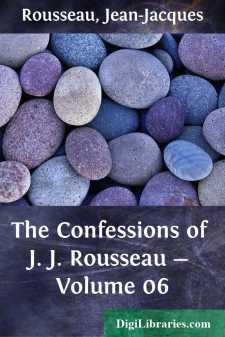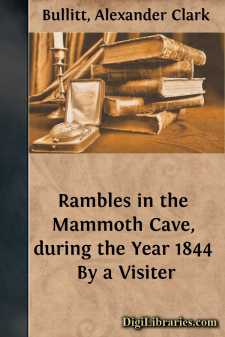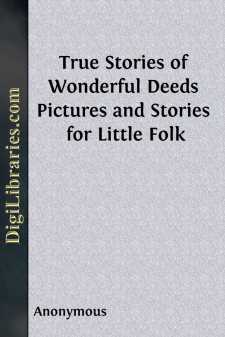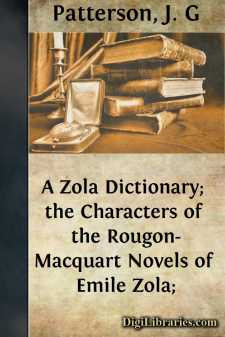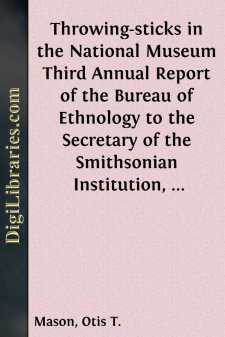Non-Classifiable
- Non-Classifiable 1768
Non-Classifiable Books
Sort by:
Hoc erat in votis: Modus agri non ila magnus Hortus ubi, et leclo vicinus aqua fons; Et paululum sylvae superhis forel. I cannot add, 'auctius acque di melius fecere'; but no matter, the former is enough for my purpose; I had no occasion to have any property there, it was sufficient that I enjoyed it; for...
more...
LETTER I. If we view the progress of this terrific malady, as it tends to disorganise society wherever it shows itself, as it causes the destruction of human life on an extensive scale, or as it cramps commerce, and causes vast expense in the maintenance of quarantine and cordon establishments, no subject can surely be, at this moment, of deeper interest. It is to be regretted, indeed, that, in this...
more...
December.—They will not allow me to go home, and I must write these things down for fear I forget. It will help to pass the time away. It is very hard to endure this prison life, and know that my sons think me insane when I am not. How unkind Mrs. Mills is today; does she think this sort of treatment is for the good of our health? I begged for milk today, and she can't spare me any; she has not...
more...
CHAPTER I. Mammoth Cave—Where Situated—Green River—Improved Navigation—Range of Highlands—Beautiful Woodlands—Hotel—Romantic Dell—Mouth of the Cave—Coldness of the Air—Lamps Lighted—Bones of a Giant—Violence of the Wind—Lamps Extinguished—Temperature of the Cave—Lamps Lighted—First Hoppers—Grand Vestibule—Glowing Description—Audubon Avenue—Little Bat Room—Pit...
more...
by:
Anonymous
The Royal Oak There is in Shropshire a fine oak-tree which the country people there call the "Royal Oak". They say it is the great-grandson, or perhaps the great-great-grandson of another fine old oak, which more than two hundred years ago stood on the same spot, and served once as a shelter to an English king. This king was Charles II, the son of the unlucky Charles I who had his head cut...
more...
by:
J. G Patterson
INTRODUCTION Emile Zola was born at Paris on 2nd April, 1840. His father, Francois Zola, was a man whose career up to that time had not been a success, though this was not due to any lack of energy or ability. Zola pere was of mixed nationality, his father being an Italian and his mother a Greek, and it is not unlikely that his unrest and want of concentration were due to the accident of his parentage....
more...
by:
Otis T. Mason
I.—THROWING-STICKS IN THE NATIONAL MUSEUM. By Otis T. Mason. Col. Lane Fox tells us there are three areas of the throwing-stick: Australia, where it is simply an elongated spindle with a hook at the end; the country of the Conibos and the Purus, on the Upper Amazon, where the implement resembles that of the Australians, and the hyperborean regions of North America. It is of this last group that we...
more...
by:
Charles Munde
PREFACE. In offering this pamphlet to the Public in general, and to Parents and Physicians in particular, I have no other object than that of contributing my share to the barrier which the medical profession has attempted, for more than two hundred years, to raise against the progress of the terrible disease which carries off upon an average, half a million of human beings annually. All the efforts of...
more...
PICKWICKIAN MANNERS AND CUSTOMS. No English book has so materially increased the general gaiety of the country, or inspired the feeling of comedy to such a degree as, “The Pickwick Club.” It is now some “sixty years since” this book was published, and it is still heartily appreciated. What English novel or story is there which is made the subject of notes and commentaries on the most...
more...
More than 200 years have passed since the Pennsylvania farm wagon, the ancestral form of the Conestoga wagon, first won attention through military service in the French and Indian War. These early wagons, while not generally so well known, were the forerunners of the more popular Conestoga freighter of the post-Revolutionary period and also of the swaying, jolting prairie schooners that more recently...
more...


